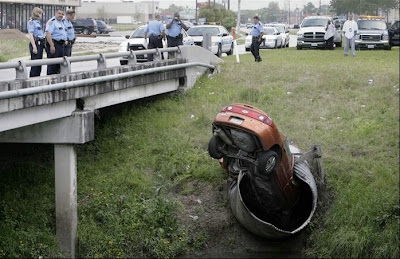Allstate Sues Florida Neurologic Clinic for $7.6M in False Claims
A Florida neurologic clinic that specializes in treating patients with traumatic brain and spinal cord injuries is being sued by a major automotive insurance company for more than $7 million in false claims stemming from charges it abused patients, failed to provide treatment, and kept them hospitalized without medical justification.
Allstate Insurance Co. has filed suit against the Florida Institute for Neurologic Rehabilitation, Inc., and its owner, Joseph Brennick, in the U.S. District Court for Middle District of Florida under the federal Racketeer Influence and Corrupt Act, for breach of contract, and a variety of fraud charges.
At stake, $7.6 million in allegedly false medical payments for injured drivers insured by Allstate in the state of Michigan.
The Wauchula, Fla.-based FINR advertises itself as the leader in treating traumatic brain injuries, neurorehabilitation, neuropsychiatric disorders, and spinal cord injuries. Its basic services include offering occupational speech physical therapy, and counseling to help injured drivers make the transition from the hospital to their homes.
Although FINR is located in Florida, its largest contingent of patients came from Michigan, where the company has carried out an aggressive and extensive marketing campaign using online resources, circulating print advertising materials, making presentations at conferences, and holding seminars.
No Spending Cap
Unlike most states such as Florida, which caps no-fault automobile medical benefits at $10,000 for emergency cases and $2,500 for non-emergency care, Michigan offers medical benefits with no spending cap. And those medical benefits can be paid out over an unlimited time period.
Allstate charged that Brennick through FINR took advantage of those unlimited benefits in many ways, first and foremost by keeping patients as long as possible.
Under Florida law, FINR is licensed to provide temporary services and all patients are required to have a treatment plan within three days of being admitted and a plan for being returned home or to a longer term facility within 30 days.
Specifically, the law states that “all residents shall use the transitional living facility as a temporary measure and not as a permanent home or domicile.”
Instead of developing those treatment and transition plans, Allstate charged that FINR basically “warehoused” patients so they could charge the insurer a daily per diem rate that is in some cases equaled a $1,000 per day.
For example, a 13-year old who was hurt in a motorcycle accident in 2002, spent six years at FINR at a cost of roughly $1.8 million. Investigators, however, found out the patient rarely received treatment and that the staff neglected to take into effect several other medical conditions that put into question whether he should have been at FINR at all.
Allstate also pointed to other cases where patients received little to no treatment at all.
“With the except of the few hours each day that patients received vocational training, FINR patients were largely confined to their living quarters with no meaningful therapy or rehabilitative treatment,” charged Allstate in the suit.
To hide these facts, Allstate charged that Brennick used a variety of means including falsifying medical documents and demanding per diem contracts to avoid having to itemize bills. Allstate noted that since Michigan law required it to pay FINR’s bills within 30 days of receiving them it offered the insurer little time to question any charges.
“Allstate relied to its detriment upon the presumption of honesty accorded the medical documentation submitted by FINR,” stated the insurer in the lawsuit.
This not the first time Brennick has had a brush with authorities. Previously, he had worked for his father Charles Brennick, who owned the New Medico Health Care System, a chain of 42 rehabilitation facilities.
In 1992, the Federal Bureau of Investigation launched a probe into the operation based on allegations the clinic took advantage of patients and their families by inflating their expectations over a patient’s prospects for a recovery only to discharge them when their insurance benefits expired.
As a result of that probe, the ownership of the company was turned over to Joseph Brennick, who reincorporated it in Delaware and began operating in Florida under the name FINR.
Full Attention Needed
The Consumer Federation of the Southeast reacted to Allstate’s allegations by calling on federal and state authorities in Florida, Michigan, and Connecticut, which is also removing patients from FINR, to investigate the medical facility’s practices
Consumer Federation Executive Director Walter Dartland said the government officials needed to aggressively probe FINR’s care for patients and how they bill insurance companies for those services.
“While we must ensure taxpayer dollars and consumer insurance premiums are being defended, protecting the well-being of FINR’s patients is the top priority,” said Dartland. “These grave new assertions from Allstate deserve the full attention of authorities at the state and federal levels.”
Allstate’s charges has caught the attention of Florida regulators, as the Agency for Health Care Administration, the Department of Health, and the Department of Children and Families made an unannounced inspection trip to FINR’s clinic earlier this month.
Among other things, a review of 98 FINR residents found that 50 patients didn’t even have a diagnosis of a spinal-cord injury or traumatic brain injury and, therefore, did not qualify to be treated at the facility. As a result, regulators are requiring those patients to be moved to other locations.
Regulators also cited FINR for not having initial treatment plans for patients and discharge plans as required from a transitional facility.
Another practice at FINR that is attracting the attention of regulators is the use of the so-called “Brief Assisted Required Relaxation” procedure, or as it is known, BARR.
The procedure calls for three individuals to physical restrain a patient whose behavior could cause harm to themselves or others. The physical restraint can be followed by the use of drugs to calm the patient and secluding the patient from others for an indefinite period.
The BARR procedure is supposed to be used only when all other methods to calm a patient fail. However, patients have complained that FINR was too quick and harsh in using the method and that the staff’s actions may have contributed to two deaths at the facility in the past two years.
It was all part of what Allstate lawyers labeled “a culture of abuse and violence,” which led some patients to describe to their time at FINR as being in “prison.” Since 2005, The Florida Department of Children and Families received 514 complaints of abuse or neglect, with 37 of those complaints being turned over to law enforcement officials.
On the advice of legal counsel, FINR has yet to turn over the BARR documents to regulators.
Florida DCR Secretary David Wilkins said that the three agencies are still pursuing these issues and others to ensure patients are protected.
“We will continue to investigate any allegations of abuse or neglect to this vulnerable population and provide this information to law enforcement and the other agencies involved,” said Wilkins in a statement.








